There are few places in America where the dividing line in the 2012 election is as clear as the desolate stretch of Harrison Avenue on the outskirts of Canton, Ohio. On one side of the street is the smoke-belching Timken steel plant, its owners generous contributors to the Republicans. On the other, four of the workers, members of the steel union, distribute leaflets on behalf of Barack Obama.
It was just after dawn on the first bitterly cold day of autumn and, even clad in hats and heavy jackets, they were shivering. But no one was complaining. They were on a mission, handing out pro-Democrat leaflets to sleepy-eyed, largely uninterested workers coming off the night shift and others about to start the day shift.
"The only motivation I need for getting out early in the morning is knowing this election will decide whether organised labour still exists afterwards in this country or not. This election could erase 50 to 60 years of struggle by organised labour," said Joe Sterling, 48, one of the four. A former carpenter who became a steelworker, he has been on leave since May working full-time on the campaign.
Harrison Avenue provides a powerful image of how polarised this election has become, especially between the classes. But Timken's importance lies not in the symbolism but in its location, one of the biggest employers in Stark County, among the most intensely fought-over areas in the whole of America. How Stark County votes is usually how Ohio votes and Ohio looks as if it will decide who will be the next White House incumbent.
It is too close to call and the numbers of volunteers out for Obama is down on 2008 – as is the level of enthusiasm. "I am nervous," said Susie Camper, 69, another one of the four outside the gates. She had been up since 5.30am to get to the factory in time to leaflet. "It is kind of scary if Romney becomes president."
Camper, Sterling and tens of thousands of other union members like them across the country are putting in long days in the swing states, working the phone banks and going door to door.
In terms of volunteers and financial donations, the unions are one of Obama's biggest assets, the shadow army to his official campaign teams.
The union contribution tends to go largely unrecognised, their role in the campaign mainly ignored by the media, and with little in the way of thanks afterwards from Obama and the politicians they help into office. "Unions have become a dirty word," one union official said.
It was not always so. American unions have a proud history, at least as far as those on the left are concerned: from the violent clashes in the pits and steelworks across Pennsylvania at the latter part of 19th century to the New York garment workers' strike at the start of the 20th century, the unions were the key to winning decent wages and working conditions. The unions peaked in the 1950s, with about 30% of the workforce signed up.
Today, membership has dropped dramatically, down to only 11%, partly a result of the highly publicised stories of corruption in the 1950s and 60s, especially those involving the Teamsters, and partly as a result of anti-union legislation, a creeping process brought in by Republican governors and legislatures. Now 23 out of the 50 states are "right-to-work", with laws that prohibit unions from requiring non-members to pay dues.
The fear of the unions is that if Romney wins the White House, this process will accelerate.
"What we are witnessing is corporate greed out of control," said Kathleen Kelly-Calcei, 55, a full-time official with the AFL-CIO, the federation representing 56 unions. Kelly-Calcei runs the campaign war room in Canton, one of about a score of AFL-CIO field offices in Ohio. A poster near the entrance sums up her uncompromising spirit: "Go Hard or Go Home."
"I fear Romney will go in for the kill with federal legislation. I definitely think he is committed to those who are funding him to get rid of the unions. It will be devastating. There will be no one standing in the way of the corporations."
Kelly-Calcei and others cite as evidence the way the Republicans, after wins in the 2010 mid-term elections, immediately moved to introduce anti-union legislation in Wisconsin, Indiana and elsewhere.
If unions are in decline, then why, union officials ask, are they the number one target for Republicans? A steel union official in Canton, Joe Hoagland, 57, has one answer. Workers at Timken earn about $20-$23.50 an hour. Without the unions, workers would be earning $12 an hour, as they do in the "right-to-work" states in the South, Hoagland said.
Another reason is that an attack on the unions is an attack on the Democratic party. Without union money, the Democrats would be struggling to match the Republicans. The unions are coy about how much they contribute but estimates run into the hundreds of millions of dollars. One union alone, the American Federation of State, County and Municipal Employees, said in the summer it planned to spend $100m.
The union contributions are not just in terms of direct donations or paying for expensive ads in the swing states, but in terms of hours.
The United Steelworkers alone is deploying 600 of its full-time staff and paying the wages and health insurance for 150 workers such as Sterling who have taken time off work to help. On top of this, the union has lots of unpaid volunteers, an estimated 10,000, each working at least a three-hour shift each week.
"Our goal is to have 11 contacts from the union with every member. In some places, it is 14," Tim Waters, national political director of the steelworkers' union, said.
Obama campaign offices across the US attract a lot of young, affluent and college-educated staff and volunteers. Those running the parallel union operations tend to be predominantly working-class, more inclined to openly display their passion, more direct and more inclined to argue.
The four outside Timken knew most of the workers going in and out, and their leaflets are mostly accepted, either out of shared conviction or just politeness. Others decline, more interested in getting to their cars and home or because they are Republicans. An estimated 30% of all union members across the country will vote Republican.
Another of the four outside Timken, Scott Jacob, 57, a furnace operator, got into an argument with a Romney-supporting worker. It was the kind of exchange unlikely to be replicated by one of the young middle-class Obama staffers, who are told not to argue with voters.
"I told him if he votes Romney, he would see what happens to social security and Medicare benefits. He said he did not think that would happen," Jacob said. "I told him: 'Bend over. You are going to get screwed if you vote for Romney.'"
This uncompromising approach to campaigning is evident too in union ads. An ad paid for by a group linked to the AFL-CIO launched last week accused Romney of being "an economic traitor".
What do companies such as Timken get if Republicans win? A more business-friendly administration, certainly. And even more direct rewards. One of its owners was a big contributor to George W Bush, to the extent that he was given ambassadorship to Germany.
What will the unions get in return if Obama wins? Not very much, union officials said. They would like legislation giving unions nationwide rights but are not expecting that to happen. They would like tougher responses to China to ensure a more equal playing field in trade. But if all they get is to see Obama's healthcare reforms embedded, that would be a big bonus for workers and they will settle for that.
After election night, the officials and volunteers will pack up their offices and have a few days off. Then they will be heading back for the midnight shift.
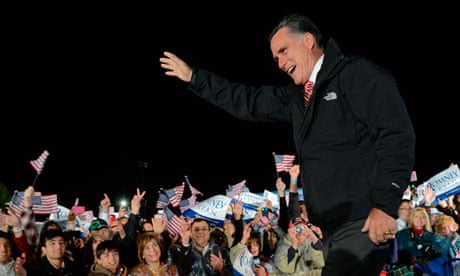
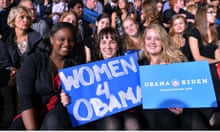

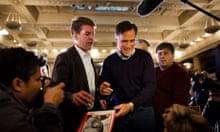
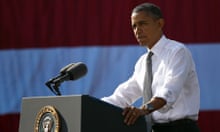
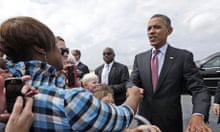

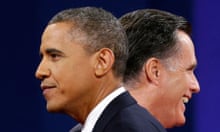
Comments (…)
Sign in or create your Guardian account to join the discussion